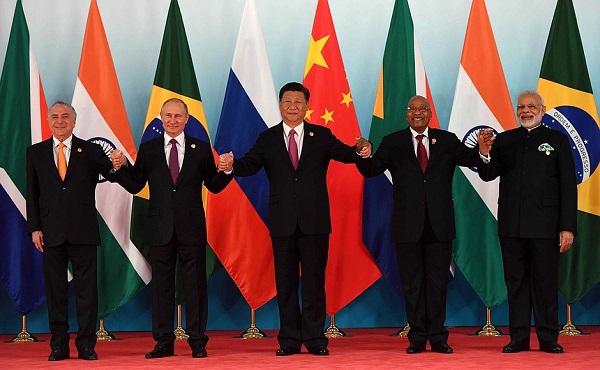Andrew Korybko |
Xiamen Declaration that emerged from this week’s BRICS Summit in China is important both for what it includes, but also what it doesn’t.
There were a lot of platitudes spread throughout the text about the need to enhance full-spectrum integration between the BRICS countries, strengthen economic governance institutions such as the G20, and reform international political organizations like the UN, but there are also a few passages that are very significant and deserve to be paid some extra attention to.
The most glaring omission of all from the document was that there’s nothing directly stated within it about China’s One Belt One Road global vision of New Silk Road
In making the best use of our limited time, let’s talk about some of the broader things that the BRICS countries agreed to, and then focus a bit on the important inclusions and exclusions in their joint statement.
Read more: BRICS declaration: China did exactly what it wanted!
For starters, the concept of BRICS Plus is clarified a bit as being the BRICS’ outreach and cooperation efforts with Emerging Markets and Developing Countries (EMDC), which is broad enough to even pertain to Russian Valdai Club expert Yaroslav Lissovolik’s proposal from earlier this year for each member to include their institutional spheres of regional influence into the bloc.
The BRICS countries also decried what they termed as “inward-looking policies and tendencies”, which is a euphemism for protectionism, and “strongly deplore[d]” North Korea’s H-Bomb test. They all threw their support behind the African Union and regional continental organizations in resolving the crises in the Democratic Republic of the Congo, Libya, South Sudan, Somalia, the Central African Republic, and Western Sahara, and signaled unspecific concern over the situation in Yemen.
There’s no clear reason why the BRICS countries couldn’t come to a unanimous agreement about adding even a vague reference to Venezuela in the Xiamen Declaration
The most important inclusions have to do with the Syrian and Afghan peace processes, which the BRICS countries say should be Syrian- and Afghan-led and –owned, and they lauded the Astana and Moscow peace processes for each respective conflict. Altogether, it increasingly looks like the Syrian conflict resolution model is being applied towards Afghanistan, though with less success as of now.
Read more: The US encourages BRICS and wants Pakistan to change its approach.
Another major inclusion in the Xiamen Declaration was the list of terrorist groups that were mentioned, which included some Pakistani-based ones that are already declared illegal by Islamabad. Some Indian voices thought that this signaled a kind of victory for New Delhi, but if anything, it was to Pakistan’s benefit because it emphasized that the country is on the forefront of the Global War on Terror.
Some Indian voices thought that this signaled a kind of victory for New Delhi, but if anything, it was to Pakistan’s benefit because it emphasized that the country is on the forefront of the Global War on Terror
To conclude with the notable omissions from the joint BRICS statement, it was significant that Mali and the terrorist groups located there weren’t included in the list of ongoing African conflicts, nor were Nigeria and Boko Haram. In addition, there’s no clear reason why the BRICS countries couldn’t come to a unanimous agreement about adding even a vague reference to Venezuela in the Xiamen Declaration, although they did so for Yemen despite Russia and India’s growing ties with Saudi Arabia and China’s excellent ones with the Kingdom.
Read more: Can BRICS help India and China mend ties?
And finally, the most glaring omission of all from the document was that there’s nothing directly stated within it about China’s One Belt One Road global vision of New Silk Road connectivity, which was probably done on purpose in order to avoid irking India as part of a prospective deal over the Donglang/Doklam Plateau.
https://sputniknews.com/radio_context_countdown/201709081057209729-brics-alshabaab-daca/
DISCLAIMER: The author writes for this publication in a private capacity which is unrepresentative of anyone or any organization except for his own personal views. Nothing written by the author should ever be conflated with the editorial views or official positions of any other media outlet or institution.
Andrew Korybko is a political analyst, journalist and a regular contributor to several online journals, as well as a member of the expert council for the Institute of Strategic Studies and Predictions at the People’s Friendship University of Russia. He specializes in Russian affairs and geopolitics, specifically the US strategy in Eurasia. The views expressed in this article are author’s own. It does not reflect Global Village Space Editorial policy.














